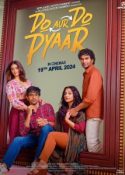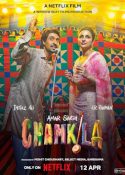 When you have Aamir Khan associated with a film, you know one thing is confirmed: the film is going to be better than the rest. Last year we saw Aamir in the acclaimed and award winning 3 Idiots. And while you won’t see the National Award winning actor on screen for a while, you are in for a treat. Taking on the producer cap yet again, the actor brings to you Peepli [Live] . Directed by ex-NDTV journalist Anusha Rizvi, Peepli [Live] is a satire look at rustic life in India. While it is a rather serious subject, the execution is completely different to what audiences have seen in the past. There are no big names in the in film — in fact none of the actors will ring too much of a bell. But irrespective of the non star cast, the film has already managed to gain immense accolades at a number of renowned film festivals that it has competed or screened at including Sundance and Cannes. Its greatest acclaim came at the Durban International Film Festival where Peepli [Live] was crowned Best Feature Film Winner. The jury quote, “Peepli Live is an ambitious and well-realized film that deals with serious political issues in a witty and entertaining manner. It creates an enchanting world of colorful characters, images and music that engrosses viewers throughout.” It was Aamir who took it upon himself to promote the film globally. BollySpice caught up with the actor-producer during his time in New York to discuss all things Peepli [Live] !
When you have Aamir Khan associated with a film, you know one thing is confirmed: the film is going to be better than the rest. Last year we saw Aamir in the acclaimed and award winning 3 Idiots. And while you won’t see the National Award winning actor on screen for a while, you are in for a treat. Taking on the producer cap yet again, the actor brings to you Peepli [Live] . Directed by ex-NDTV journalist Anusha Rizvi, Peepli [Live] is a satire look at rustic life in India. While it is a rather serious subject, the execution is completely different to what audiences have seen in the past. There are no big names in the in film — in fact none of the actors will ring too much of a bell. But irrespective of the non star cast, the film has already managed to gain immense accolades at a number of renowned film festivals that it has competed or screened at including Sundance and Cannes. Its greatest acclaim came at the Durban International Film Festival where Peepli [Live] was crowned Best Feature Film Winner. The jury quote, “Peepli Live is an ambitious and well-realized film that deals with serious political issues in a witty and entertaining manner. It creates an enchanting world of colorful characters, images and music that engrosses viewers throughout.” It was Aamir who took it upon himself to promote the film globally. BollySpice caught up with the actor-producer during his time in New York to discuss all things Peepli [Live] !
Now everyone is looking forward to Peepli [Live] but you’ve claimed that you’re really nervous! Why is that? The film looks fantastic!
Well, I get nervous about all my films! (Laughs) So much emotions are in the film, everyone’s: Anusha [Rizvi], the cast and crew and of course me included. We have really worked on Peepli [Live] with a lot of love and care. And so when it’s about to release, we are all nervous. I guess that’s natural.
 By now we all know that Peepli [Live] talks about rural issues in India; very similar to that of Lagaan. What is the main difference?
By now we all know that Peepli [Live] talks about rural issues in India; very similar to that of Lagaan. What is the main difference?
Well, sure. They both are films about rural life in India but the difference is that Lagaan is more larger than life; a fairytale like story like an Asterix comics. But Peepli [Live] is more realistic. It’s very real; the setting, the actors, the performances — they are all very real. The other difference is that Lagaan is essentially a drama while Peepli [Live] is a satire. So there is a lot of humor; it’s a fairly funny script. It’s also very thought provoking and quite heartbreaking towards the end. It’s a different genre of film.
The media is pretty much put under fire with the film and of course, the film pokes fun at the reality TV craze in India. The idea is very innovative.
The film is very entertaining to watch; it has a good pace. And since it’s a satire, it’s a humorous take on all of us; on us as a society, on politicians, on administration, the media, all of us in general.
 How true to real-life would you say Peepli [Live] is? Essentially if we showed the film to farmers, would they be able to relate to the situations?
How true to real-life would you say Peepli [Live] is? Essentially if we showed the film to farmers, would they be able to relate to the situations?
I think so. I think it’s a fairly accurate portrayal of what happens in India today. I think it’s a great window into rural life. For someone like me who is from a city and has lived all his life in a city, it’s a very sensitizing film as well. It tells you a lot of how things are in a huge bulk of our country. The bulk of our country lives in rural parts of India.
What made you agree to make fun of yourself in the film? Which of course, has become an interesting marketing technique on your part.
I thought since we’re making fun out of this, let’s start with me! (Laughs)
The film has been received very well by film festivals around the world. Did you anticipate such feedback and response? And what made you decide to take it to film festivals first before it was released regularly?
Well, first of all we got a great response at Sundance [Film Festival], Berlin [Film Festival] and Seattle [International Film Festival] and all the festivals it has been to. So we’re really thrilled about that. And I think we wanted to take it to festivals was because this film is aimed at audiences who regularly watch Indian films, so that is the primary audience, but I believe it also has the potential to engage a world audience which is why we were trying it out in festivals; to see how the audiences there react to a film like this. And we were really thrilled to see the response that we got from the film at both these festivals.
What attracted you to the script more than anything else?
I think the script on the whole. It’s a human story; it touches you. It’s very funny and makes you laugh a lot. It’s also very heart-breaking and thought provoking. So I guess I liked it all.
 How would you rate Anusha Rizvi as a director and writer especially since this is her first film?
How would you rate Anusha Rizvi as a director and writer especially since this is her first film?
She’s fantastic. I think she’s done a wonderful job. First of all she’s written a brilliant script and it’s not an easy script to execute so the manner in which she has translated it onto screen, what she had on paper, is quite amazing to see. It has a really raw and vibrant quality to it. It looks like it’s really happening. The characters are really vibrant and the lines are very good, so the humor pops. And then when she wants to make sad, she does. I think it’s a very layered script and she’s done it really well. As a director this is her first film and it’s quite amazing to see such good work coming from her.
 I believe many of the actors are also very esteemed theater actors. Was using actors who were not so commercial an intentional move?
I believe many of the actors are also very esteemed theater actors. Was using actors who were not so commercial an intentional move?
That was intentional on her part. I think she wanted to the cast to be very real looking so a lot of the cast is actually in a film for the first time. And since the film is set in a rural backdrop, she wanted people who looked the part; when you see them, you feel that they are from there. They’ve done an outstanding job I think. I mean I’ve been acting for many years but when I see their performance, I’m in awe. (Laughs)
You’re being modest now. The language in the film is said to be vulgar and raw but very typical of how it is spoken in rural India. But this caused issues at the Censor Boards. When you read the dialogues of the film, were you taken aback?
Well, you know there is not that much of abusive language. There are a few occasions when there is abusive language but it’s not all over the place; there are just a few places, here and there. But even if it comes once, you still get an A certificate. So Anusha wanted to keep it authentic which is why she didn’t want to change any of that and I was okay with that. I think when you’re 15 and above, you’ve heard all kinds of languages but it’s nice to hear that authentic language being used. And it’s not overt use of abusive language.
Check back as we give you the second installment with BollySpice’s interview with by far the best actor in Bollywood, Aamir Khan.











